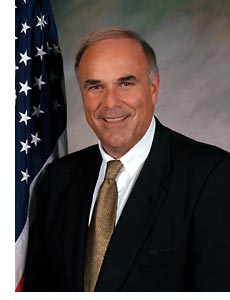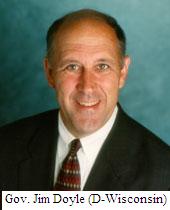EarthFirst Technologies, Incorporated will be building America’s first bio-refinery, capable of producing ASTM 6751 biodiesel from palm-based methyl esters.
Similar projects have been built in Singapore and Malaysia. This story on the Power Online web site says the new bio-refinery will be in Channahon, Illinois:
The key to the Company’s Bio-refinery is the use of palm oil based feedstock. The chemical composition and stability of palm oil make it suitable for refinement into numerous products.
To secure the continuous availability of palm oil feedstock, EarthFirst has entered into a 15-year Supply Agreement with LODERS CROKLAAN USA, LLC (“Loders”), a wholly owned subsidiary of the IOI Group. IOI has an existing supply chain for palm oil products from Malaysia to Channahon, Illinois which serves Loders’ specialty fats business supplying the requirements of the US food industry. The Company also has a 15-year Agreement with Loders to lease a currently unused vegetable oil fractionation facility, located on its own self-contained site, adjacent to Loders’ other operations in Channahon.
The Illinois site was chosen because it sits in the center of seven Midwestern states that consume almost 90% of the biodiesel currently produced in the U.S. In addition, Illinois has biodiesel incentives to offer, as well as the federal subsidies already out there. Officials say there will also be a market for the other bio-refinery products.


 Two veterans of the energy business from Houston, Texas have been named to the board of directors of Better Biodiesel, Inc…. a Utah-based company that uses a proprietary technology that eliminates the use of some caustic chemicals for the production of biodiesel (see
Two veterans of the energy business from Houston, Texas have been named to the board of directors of Better Biodiesel, Inc…. a Utah-based company that uses a proprietary technology that eliminates the use of some caustic chemicals for the production of biodiesel (see  This press release from the Renewable Fuels Association says the New Era Act, introduced by Iowa Congressman Bruce Braley, is before a congressional committee and would promote an educated and skilled workforce to meet the demands of an expanding renewable fuels industry:
This press release from the Renewable Fuels Association says the New Era Act, introduced by Iowa Congressman Bruce Braley, is before a congressional committee and would promote an educated and skilled workforce to meet the demands of an expanding renewable fuels industry: Team Ethanol partner
Team Ethanol partner 
 Pennsylvania Governor Ed Rendell was at the dedication of a new wind farm… the seventh one in the state.
Pennsylvania Governor Ed Rendell was at the dedication of a new wind farm… the seventh one in the state. 
 South Dakota Senator John Thune says Senate leaders want to pass an energy bill by the Fourth of July… but warned a group of about 100 people this week at the Ethanol Public Policy Summit in Sioux Falls that conflict looms on the horizon.
South Dakota Senator John Thune says Senate leaders want to pass an energy bill by the Fourth of July… but warned a group of about 100 people this week at the Ethanol Public Policy Summit in Sioux Falls that conflict looms on the horizon. REX Stores, usually known for selling televisions, stereos, and appliances is buying into ethanol.
REX Stores, usually known for selling televisions, stereos, and appliances is buying into ethanol. Wisconsin Governor Jim Doyle is calling on Republicans in his state’s legislature to back his plan to spend $30 million on renewable energy.
Wisconsin Governor Jim Doyle is calling on Republicans in his state’s legislature to back his plan to spend $30 million on renewable energy. The smell of french fries fills the air. But this isn’t the back of some fast food restaurant… it’s a construction site where 100% biodiesel is fueling the heavy equipment.
The smell of french fries fills the air. But this isn’t the back of some fast food restaurant… it’s a construction site where 100% biodiesel is fueling the heavy equipment. The NBB has
The NBB has